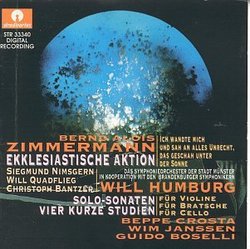| All Artists: Zimmermann, Humburg Title: Ekklesiastische Aktion Members Wishing: 1 Total Copies: 0 Label: Stradivarius Release Date: 6/20/1995 Genres: Pop, Classical Styles: Vocal Pop, Opera & Classical Vocal, Chamber Music, Instruments, Strings Number of Discs: 1 SwapaCD Credits: 1 UPCs: 723722043321, 8011570333407, 801157033340 |
Search - Zimmermann, Humburg :: Ekklesiastische Aktion
 | Zimmermann, Humburg Ekklesiastische Aktion Genres: Pop, Classical
|
Larger Image |
CD Details |
CD ReviewsA profoundly important creator of extremes scarecrow | Chicago, Illinois United States | 05/16/2000 (5 out of 5 stars) "What the world actually remembers of Bernd Alois Zimmermann is profoundly hidden in the cracks and crevices of the serious music world. His opera "Die Soldaten" was staged in New York not long ago, yet hardly anything else is ever programmed this side of the Atlantic. His music is a profundly intense experience,difficult and overwhelming to listen to and that may be the cause of his neglect in the States. Zimmermann's music speaks with great moral conviction as a subtext, and his life philosophy was that anything man does or creates has in fact already been done, all the ideologies have been played out, a man ahead of his times, for that has only occurred quite recently with the collapse of the Berlin Wall.He was a late bloomer creatively,having dabbled in jazz,collage,aleatoric gesturing and extreme dodecaphonic music.He went his own way not climbing aboard any compositional fashion as serialism.His worldview responded to the post-war demise of art that the composer, the artist must have the courage to step beyond this impasse unpretenciously. His "Ekklesiastische Aktion",is like the summation of this view.Although couched in a negativity in content, some refer to it as an opera, his second, but it is more a dramatic invention of a little over 32 minutes in length. It borrows texts from Dostoevsky's "The Brothers Karamazov" and Biblical verse,and not since Dante has such moralizing found its way into a performative text.The text reveals the injustices of the world, the darkness which envelopes man, the dead, the exploited and the weaknesses of man.But it is also about the spirit of man and the human condition, where it resides. There are only three roles here, three men, two who simply recite this text and one a Bass that sings it.The text is continuous nothing repeats. In this way he wanted it seems the full conviction of the text's integrity to be very clear, to be expressed. These three voices interweave interestingly enough the singing role with the spoken text, sometimes the singer would begin then the speaker would continue, then the bass to complete his part. The music accompaniment indeed portrays itself in dark colours and gongs, percussion and brooding trombones in extreme concentration here. Zimmermann brings overwhelming power by allowing the tones to sustain creating screens of dark brass sound, so the Bass would roar against the richly voiced yet atonaly dissonant trombones. Likewise when the strings enter they to sustain atonal chords,spider webs of sound having this ethereal-like quality, nasal harmonics and graphic sounding plucked strings,like shocks to the body. Toward the end, the integrity of the roles disintegrates and becomes extremely fragmented in that only a few words are either sung or recited from each in rapid succession.Siegmund Nimsgern has a powerful voice that equally matches Zimmermann's expressionist gestures. Also included here are string solos of varying weight and dimension. You need a possessed performer to play this music convincingly and I didn't feel this with violinist Beppe Crosta, you need technical power to rip through the resonant octaves in the Toccata movement with discipline and conviction.You need to consume and control this music at every emotive inch. However the more serene introspective moments were captivating.Zimmermann's music has a wide spectrum of emotive weight. The Violin solo written in 1951 has a melodic charm with Johann Sebastian Bach as a model, yet with a serious demeanor.Bach is at great distance here. The viola solo the Sonata has more dramatic power,with greater quiet moments. You always sense that these solos are accompaniments to a drama waiting for some speaking role to appear. The Cello Sonata is indeed a more serious affair, an entire timbral world is here explored,every conceivable extended technique is utilized. Again Zimmermann has a subtext at work the inscription from Ecclesiastes. 3,#1 " . . . and the Universe flows through its spaces under the sky", referring to the spirituality art must manifest itself consistent with Zimmermann conceptual aesthetic.At times the cello is transformed into other timbres as the harp. When you pluck and simultaneously harmonics the result is harp-like. Zimmermann's has powerful like phrases,short in duration,so our listening concentration is indeed at the height of being focused. For all this solo work here,the phrases are as if the drawn bow is equivalent to the human breath.Lastly the Four Short Studies are beautiful miniatures that focus on specific texture and timbre,#1 is, two different ways of bowing a mere 27 seconds, #2 is plucked, a mere 48 seconds. These are like expressionist postcards with high graphic gestures only short with a sublime-like uglyness."
|

 Track Listings (10) - Disc #1
Track Listings (10) - Disc #1